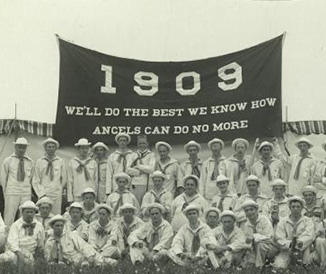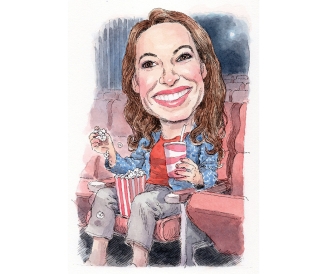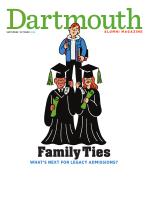Your Turn
Bird Brain
Thank you for the wonderful article on Mario Cohn-Haft ’83 [“The Bird Listener,” March/April]. We remember Mario for his amazing gift of both recognizing and voicing a wide range of bird calls. The freshman trip he led in 1982 stands out as one of our most cherished memories from Dartmouth. As we fledgling freshmen walked along various trails of the Grant, Mario would halt us with a shush. One example: “I just heard a grouse,” which completely captivated our attention as we all wondered, “What the heck is a grouse?” only to look up at his summoning and delight in seeing it high above us in a tree. As ’round the girdled earth we’ve roamed, Mario’s spell on us remains—even now, almost 42 years later. Thank you, Mario, for being one of our most cherished Big Green global treasures.
CHRISTINE HELLAUER ’86
Rockville, Maryland
SUSANNE PEPPER ’86
Sunnyvale, California
The Power of Protest
I enjoyed reading about the 2014 student protest movement, which included a takeover of Parkhurst [“Freedom Fighters,” March/April]. While the story noted several other student protests at Dartmouth, including on apartheid, I was surprised to see no mention of the Parkhurst takeover of January 1986. This activism was in response to the destruction of the anti-apartheid shanties that a student group called the Dartmouth Community for Divestment (DCD) had built on the Green. The shanties were smashed with sledgehammers in the middle of the night on Martin Luther King Jr. Day by students from the right-wing Dartmouth Review newspaper, terrifying the student activists sleeping inside. The 1986 Parkhurst takeover led to a moratorium. Classes were canceled, and speakers spoke about racism and divestment. Like the student protesters from the 2014 takeover, the DCD students from 1986 have remained in touch and have formed an informal progressive alumni network. It was a formative event for many of us and worth remembering when recalling the history of student activism at Dartmouth.
KELLY M. BONNEVIE ’87
Boston
It’s Not About the Coffee
The article on mindfulness meditation [“Everyday Zen,” January/February] was inspirational and grounding to me. I’ve been meditating for nearly 40 years daily, though it is never nearly as wholly a part of my life as it is for Brother Pháp Lưu, Buddhist monk and Dharma teacher, aka Doug Bachman ’97. The alarming increase in dementia has left us seeking ways to support and improve cognition. Meditation/mindfulness is one of these variables. Where else but at Dartmouth could students develop their own program to pursue learning and benefiting others, as did this former student? Thanks also to President Sian Beilock for her focus on student mental health and cognition.
CAROL GieG ’79
Benicia, California
“Drama King”
Thank you to Joe Gleason ’77 for accomplishing the impossible task of containing that bundle of kinetic energy, John Rassias, in mere words [“Dynamo,” January/February]. For me, as for so many, the steak-throwing, rose-piercing drama king was a life-changing influence. His inclusive warmth and respect during the very first term of coeducation launched the trajectory of my Dartmouth experience in an atmosphere of immediate belonging. As one of three women in a lecture course filled with upperclassmen, I was commanded to the stage along with everyone else to bond in a spirit of joy, laughter, and camaraderie. I will be forever grateful that when parents’ weekend rolled around that October, he invited my family to the Rassias homestead for a family dinner cooked by wonderful Mary—thus assuaging any lingering doubts my parents had about my being heard, seen, and cared for in the wilderness.
SARA HOAGLAND HUNTER ’76
Boston
The Method
I fondly remember Professor Rassias, whose impact on my four years was profound: first, when I was a sophomore on the LSA in Siena, Italy, and later as a TA for the Department of French and Italian, when I was given the opportunity to return to Siena and teach Italian to the LSA cadre using the Rassias Method. Immersive and fast-paced, the man and his method incorporated aspects of everyday mindfulness—“Focus on Right Here, Right Now” and “Minimize Distractions”—that Pháp Lưu ’97 describes in his ten steps toward a more mindful life [“Everyday Zen,” January/February]. You would not survive a Rassias drill session with a wandering mind. This happy coincidence among two unrelated articles made me smile and feel grateful for my College experience and this memorable teacher whose energy and exuberance brought his students closer.
NATALIE BEJ ’86
Delray Beach, Florida
Ratings Game
I noticed that Time magazine’s “best colleges for future leaders” ranked Dartmouth 16th nationally [“Rankings,” March/April]. That’s pretty good until you look at Bloomberg Businessweek’s ratings in 2010, which ranked Dartmouth seventh in the number of corporate presidents throughout the country who graduated from Dartmouth.
I admit that my pride is an issue here, but these rankings also affect the decisions of applicants. I h ope improving these rankings will be a priority for President Beilock.
F.G. COGGIN ’58, Tu’59
Evanston, Illinois
The Talking Cure
When I entered Dartmouth in the fall of 1963, it had a reputation of not being particularly welcoming to Jewish students. While I never experienced an overt act of antisemitism on campus, it was apparent that Jewish students were a distinct minority with unspoken limitations. The one social hub for Jews was the Jewish Life Council, led by my beloved classmate Lew Pauker ’67.
But things changed over the years. The Roth Center was created to provide a rich Jewish experience. I was fortunate to hear President James Friedman openly acknowledge Dartmouth’s past quota system for Jews. Today I am so proud of my College for the manner in which it handled the unrest and conflicting views following the events of October 7 in Israel and the resulting war [“Let’s Talk About It,” March/April]. Our president and faculty leaders created opportunities for people to speak openly, listen intelligently, and foster a continuing peaceful dialogue.
HOWARD SHARFSTEIN ’67
New York City










